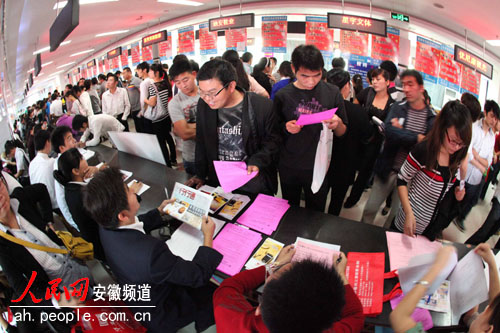Job seekers' prospects bright for Q4
 0 Comment(s)
0 Comment(s) Print
Print E-mail
China Daily, September 13, 2011
E-mail
China Daily, September 13, 2011
China's employment outlook for the fourth quarter is expected to remain promising with nearly one-third of employers planning to increase hiring, according to a survey by the global employment service provider ManpowerGroup.
 |
|
A job fair plans to provide 5,500 posts for university graduates in Haozhou, Anhui Province, in September 2011. |
The survey, due to be published on Sept 13, showed that about 29 percent of Chinese employers intend to increase their work force in the coming quarter, while only 4 percent companies expect to cut staff.
ManpowerGroup interviewed 4,328 companies on the Chinese mainland to measure employers' intentions to increase or decrease the number of employees.
"The results reveal that Chinese employers maintain optimistic hiring intentions," said Yuan Jianhua, managing director of ManpowerGroup China.
However, the uncertainty of the external macroeconomic environment, combined with the high inflation rate and rising cost of labor in China, are likely influencing employers' hiring plans. Therefore, many employers are taking a wait-and-see attitude before they add to their payrolls, he said.
The consumer price index (CPI), the main gauge of inflation, rose 6.2 percent in August from a year earlier, down slightly from a 37-month high of 6.5 percent in July, according to figures released by the National Bureau of Statistics on Sept 9.
Employers in the service and manufacturing sectors have strong hiring intentions, according to the survey.
"We recently witnessed a gradual increase in hiring activity for middle to senior managerial roles in manufacturing industries, especially the automotive, energy and pharmaceutical industries," said Sophie Shang, supply chain team manager of Robert Walters Talent Consulting Ltd.
China's official purchasing managers' index (PMI), a gauge of nationwide manufacturing activity, rose to 50.9 in August, ending four consecutive months of decline and indicating an improvement in manufacturing activity from the previous month, data from the China Federation of Logistics and Purchasing showed.
"We also saw an increase in foreign investment projects being implemented across manufacturing industries. So the most challenging thing for Chinese employers right now is to retain their employees," said Shang.
Job seekers are more likely to find more opportunities in lower-tier cities, according to the ManpowerGroup survey, which covered 16 cities.
"As the development focus shifts to other regions, we see that employers in Beijing, Shanghai, and Guangzhou, for instance, will continue to hire at a respectable but more moderate pace," said Yuan.
Employer optimism in many lower-tier cities, including Changsha, Hangzhou and Wuhan, is rising as more emphasis on business development and comprehensive infrastructure projects in these regions improve job prospects, he said.






Go to Forum >>0 Comment(s)